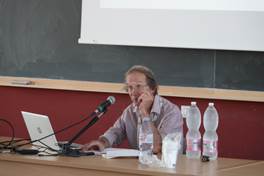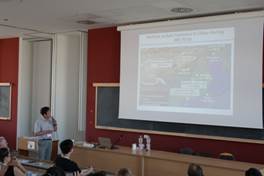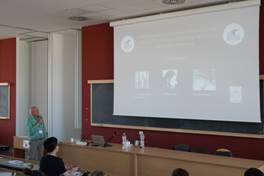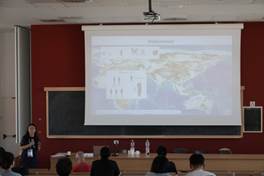from july 14 to july 20, 2023, the 21st international union for quaternary research (inqua) congress was held in rome, italy. over 20 faculty members and students from lanzhou university's college of earth and environmental sciences, engaged in research on environmental archaeology and environmental changes, participated in the conference. among them, professor zhang dongju from the college of earth and environmental sciences and academician chen fahu from the institute of tibetan plateau research, chinese academy of sciences, jointly organized the sub-forum titled "environment background and human adaptations during the transition from archaic humans to modern humans in east asia." the sub-forum was successfully held at sapienza university of rome on july 15, 2023. it focused on the environmental background and adaptations of ancient humans during the transition to modern humans in east asia. a total of 21 domestic and international scholars from lanzhou university, institute of tibetan plateau research, chinese academy of sciences, university of exeter (uk), leiden university (netherlands), university of copenhagen (denmark), sichuan university, institute of vertebrate paleontology and paleoanthropology, chinese academy of sciences, guangzhou university, peking university, shandong university, king's college london (uk), university of arizona (usa), and other universities and research institutions participated in the event, sharing their research findings. professor zhang dongju from lanzhou university presided over the entire sub-forum and delivered a presentation.

notable international archaeologists, professor robin dennell, a fellow of the british academy, and professor thijs van kolfschoten, the president of the inqua congress, attended the conference and gave presentations. professor dennell discussed "environment change and human adaptations in china between 125 and 30 ka," reviewing research progress on human activities in different regions of china during the period of 125,000 to 30,000 years ago. he discussed the environmental background of ancient human activities, human migration and diffusion, and their technological adaptations. professor kolfschoten presented on "hominin paleoenvironment in east asia: the middle paleolithic xuchang-lingjing (china) mammalian evidence," introducing the results of the animal archaeological research at the lingjing site in henan, conducted in collaboration with associate professor wang hua from the school of history and culture at shandong university. academician chen fahu, president of the chinese geographical society, presented "environment conditions affecting the arising and dispersal of modern humans in north china and the mongolian plateau," introducing the work carried out by the research team on the mongolian plateau. based on multi-index analysis of a 48-meter-long sediment core from lake daihai, the team reconstructed the environmental change history of north china over the past 80,000 years and proposed the hypothesis of the "great desert period" in the late middle pleistocene for north china and the mongolian plateau, discussing its impact on the evolution of ancient humans in east asia. professor zhang dongju from lanzhou university presented on "denisovans from baishiya karst cave on the tibetan plateau," providing a systematic overview of the research findings and recent progress at the baishiya karst cave site, including the research on xiahe mandible, the excavation, and the study of baishiya karst cave. the presentation explored the activity history, behavioral characteristics, and survival strategies of denisovans on the tibetan plateau. other members of the team, including dr. xia huan, dr. wang jian, and ph.d. candidate li yuanxin, also attended the conference and delivered oral presentations or poster introductions. more than 100 scholars from home and abroad participated in the sub-forum and engaged in extensive discussions and exchanges. this special conference is of great significance for advancing the international academic community's understanding of cutting-edge and hot scientific issues related to the evolution and adaptation of ancient humans in east asia. it will also contribute to enhancing the reputation of lanzhou university's environmental archaeology team in the international academic field and promoting the level of international cooperation and exchange activities.




background of the conference
founded in 1928, inqua is a formal scientific union member of the international science council (icsu), with 45 member countries currently. it aims to promote global quaternary science research and provide a platform for academic communication and scientific cooperation in this field. the theme of this year's inqua congress is "time for change," and more than 3,000 scholars from 103 countries attended the event.